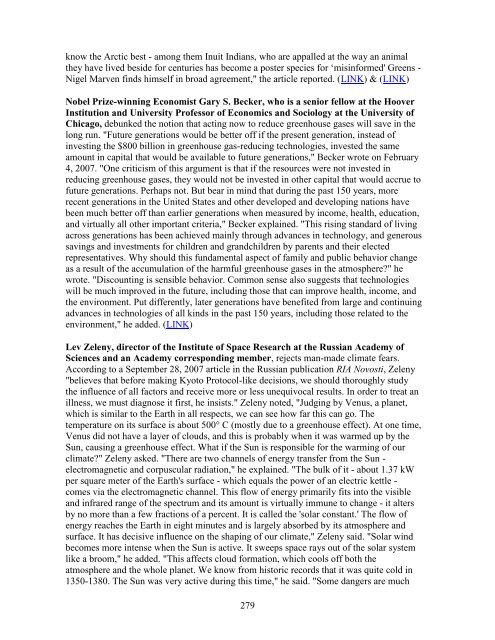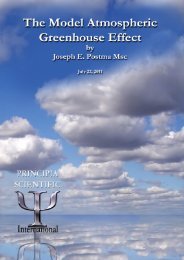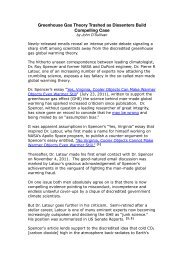Than 1000 International Scientists Dissent Over Man-Made Global ...
Than 1000 International Scientists Dissent Over Man-Made Global ...
Than 1000 International Scientists Dissent Over Man-Made Global ...
Create successful ePaper yourself
Turn your PDF publications into a flip-book with our unique Google optimized e-Paper software.
know the Arctic best - among them Inuit Indians, who are appalled at the way an animal<br />
they have lived beside for centuries has become a poster species for ‗misinformed' Greens -<br />
Nigel Marven finds himself in broad agreement," the article reported. (LINK) & (LINK)<br />
Nobel Prize-winning Economist Gary S. Becker, who is a senior fellow at the Hoover<br />
Institution and University Professor of Economics and Sociology at the University of<br />
Chicago, debunked the notion that acting now to reduce greenhouse gases will save in the<br />
long run. "Future generations would be better off if the present generation, instead of<br />
investing the $800 billion in greenhouse gas-reducing technologies, invested the same<br />
amount in capital that would be available to future generations," Becker wrote on February<br />
4, 2007. "One criticism of this argument is that if the resources were not invested in<br />
reducing greenhouse gases, they would not be invested in other capital that would accrue to<br />
future generations. Perhaps not. But bear in mind that during the past 150 years, more<br />
recent generations in the United States and other developed and developing nations have<br />
been much better off than earlier generations when measured by income, health, education,<br />
and virtually all other important criteria," Becker explained. "This rising standard of living<br />
across generations has been achieved mainly through advances in technology, and generous<br />
savings and investments for children and grandchildren by parents and their elected<br />
representatives. Why should this fundamental aspect of family and public behavior change<br />
as a result of the accumulation of the harmful greenhouse gases in the atmosphere?" he<br />
wrote. "Discounting is sensible behavior. Common sense also suggests that technologies<br />
will be much improved in the future, including those that can improve health, income, and<br />
the environment. Put differently, later generations have benefited from large and continuing<br />
advances in technologies of all kinds in the past 150 years, including those related to the<br />
environment," he added. (LINK)<br />
Lev Zeleny, director of the Institute of Space Research at the Russian Academy of<br />
Sciences and an Academy corresponding member, rejects man-made climate fears.<br />
According to a September 28, 2007 article in the Russian publication RIA Novosti, Zeleny<br />
"believes that before making Kyoto Protocol-like decisions, we should thoroughly study<br />
the influence of all factors and receive more or less unequivocal results. In order to treat an<br />
illness, we must diagnose it first, he insists." Zeleny noted, "Judging by Venus, a planet,<br />
which is similar to the Earth in all respects, we can see how far this can go. The<br />
temperature on its surface is about 500° C (mostly due to a greenhouse effect). At one time,<br />
Venus did not have a layer of clouds, and this is probably when it was warmed up by the<br />
Sun, causing a greenhouse effect. What if the Sun is responsible for the warming of our<br />
climate?" Zeleny asked. "There are two channels of energy transfer from the Sun -<br />
electromagnetic and corpuscular radiation," he explained. "The bulk of it - about 1.37 kW<br />
per square meter of the Earth's surface - which equals the power of an electric kettle -<br />
comes via the electromagnetic channel. This flow of energy primarily fits into the visible<br />
and infrared range of the spectrum and its amount is virtually immune to change - it alters<br />
by no more than a few fractions of a percent. It is called the 'solar constant.' The flow of<br />
energy reaches the Earth in eight minutes and is largely absorbed by its atmosphere and<br />
surface. It has decisive influence on the shaping of our climate," Zeleny said. "Solar wind<br />
becomes more intense when the Sun is active. It sweeps space rays out of the solar system<br />
like a broom," he added. "This affects cloud formation, which cools off both the<br />
atmosphere and the whole planet. We know from historic records that it was quite cold in<br />
1350-1380. The Sun was very active during this time," he said. "Some dangers are much<br />
279





